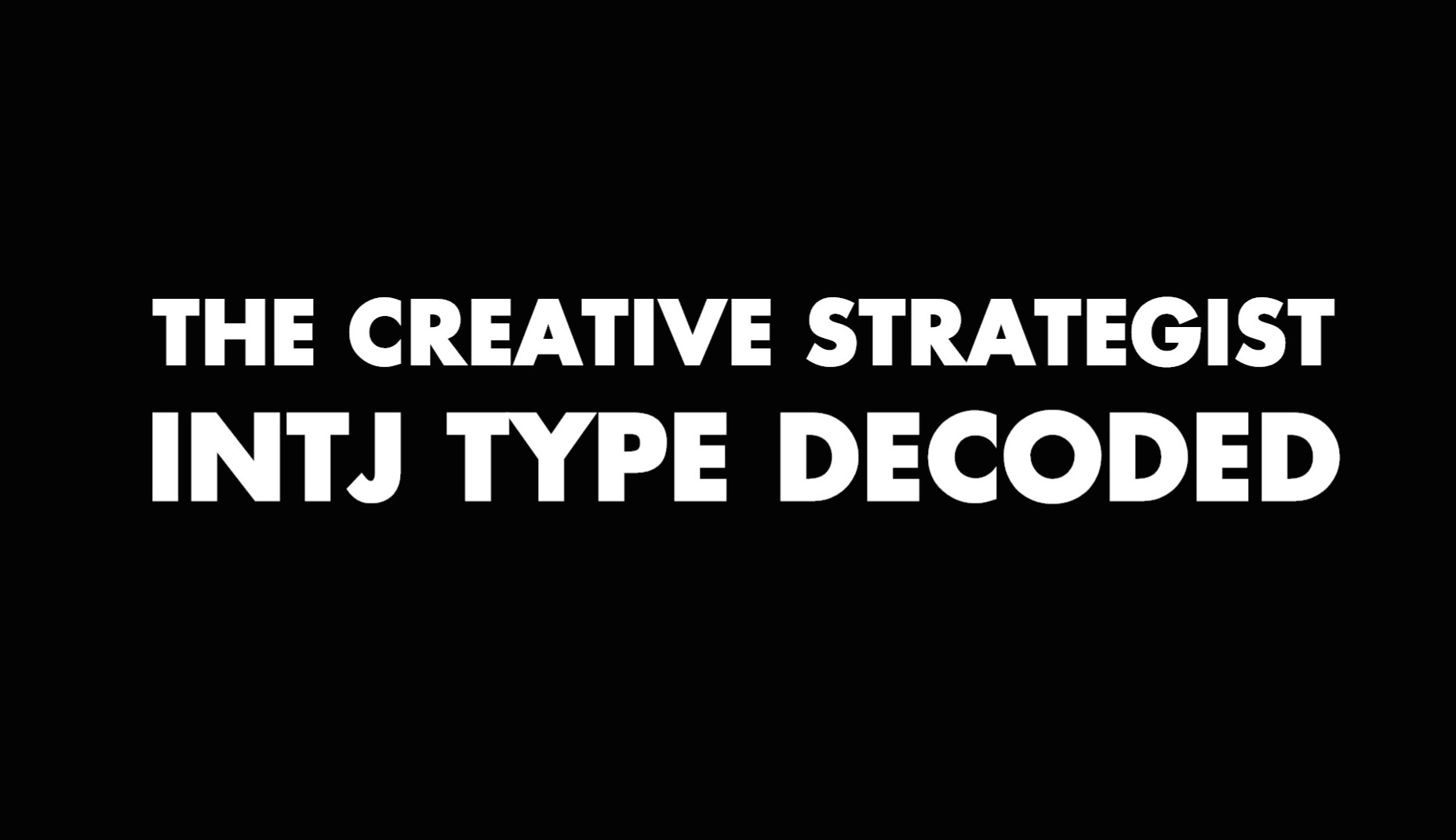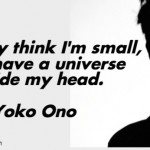As one of the rarest of the 16 Myers-Briggs types, the INTJ personality provides a fascinating glimpse into the beauties and pitfalls of the creative, yet analytical mind. I hope you enjoy this quick introduction to a personality type that is often misunderstood, but has so much to offer!
When creative meets analytical
“Be less curious about people and more curious about ideas.” ~ Marie Curie
As an intuitive and judging person, an INTJ (especially in their younger years) may feel like they are constantly contradicting themselves, being passionate in their ideals and constantly thirsty for new ideas. At the same time they often feel a deep-seeded desire to convert their own internal chaos into order.
As natural-born strategists, it is very important to the INTJ that their understanding of the world is non-contradictory. This way they are free to use their knowledge to pursue creative solutions to complex problems.
Quite often, their desire for rationality causes them to see social relationships as problems to solve. This tendency can be frustrating for both the individual and the people around them. Although the INTJ might be perfectly capable of experiencing a wide range of emotions, they are not likely to express them in the “heat of the moment”, preferring instead to wait until they have had time to rationalize them in their own mind.
Reluctant, yet effective leaders
People with this personality type will often try to avoid being the center of attention, preferring instead to move their goals forward in a less-visible role. They likely do this to minimize their risk of conflict with outside ideas.
Given the right conditions, INTJs can become very effective and respectable leaders thanks to their ability to approach large-scale problems and crises with a rational, non-emotional frame of mind.
This is where some of the real “magic” can happen for an INTJ, when they are faced with a complex issue and a seemingly impossible set of options to select from. Instead of limiting themselves to a pre-defined set of choices, the INTJ will look for ways to develop more creative alternatives without being burdened by the “groupthink” that might have led others to believe that no more options were possible.
This is a double-edged sword since the INTJ leader may sometimes appear to be uncompassionate towards others when deciding the best course of action for any given situation.
INTJs as villains
Given some of the traits described above, it should not come as a surprise that the INTJ personality is often represented in popular culture as the villain, or the cold and calculating antagonist in television shows and feature films (think: Charles Montgomery Burns’ character in The Simpsons).
Personally, I think that this portrayal of the INTJ is rooted in the tendency for our culture to associate a misunderstood personality with a hostile intent, rather than keeping an open mind.
Perhaps what is most intriguing about people with this personality type is the sheer variety of talents that can be expressed through these traits, as can be seen in the list of famous INTJs included below.
Strategic creativity can be applied in many different environments and career paths, so if you are an INTJ, you definitely do not need to limit yourself to the roles that you see on the movie screen!
INTJ: I understand, because I am one!
I am a highly creative person, and a highly technical person. When I was younger, I would go through phases in my life where I would try to eliminate one of these traits in a vain attempt to boost the other one (and vice-versa).
I had difficulty finding ways to blend my creative and rational abilities into a single “performance”, because I simply could not understand how to relate my two seemingly incompatible desires: writing computer code, and strumming my guitar (with custom strings that I fitted!) randomly on stage in front of a bunch of people.
After I discovered the world of music production, I finally understood how it was possible to accept wildly creative ideas with open arms, and mould them into a productive piece of work at the end of the day. This understanding also helped me in my career as a software consultant, where the creative process is a vital piece in solving virtually any technical problem long before a single line of computer code is ever written.
A significant step in my own maturing process as an adult has been to recognize and take ownership of many of the INTJ traits described above, while also making an everyday conscious effort to have empathy for the people in my life that I care about, whose feelings I don’t want to hurt with a blunt or ill-conceived remark that I might regret having made later. Although your personality type may heavily influence your overall abilities and desires, it will never entirely define you as a human being. This is up to you.
I hope you enjoyed this quick look into the mind of an INTJ!
Famous INTJs
Aldous Huxley
Jodie Foster
Jay-Z
Arnold Schwarzenegger
Bobby Fischer
Ashley Olsen
Carl Sagan
Chevy Chase
Katie Couric
Christopher Hitchens
Dan Akroyd
Dwight D. Eisenhower
Isaac Asimov
Mark Zuckerberg
Nikola Tesla
Sir Isaac Newton
Stanley Kubrick
Stephen Hawking
Thomas Jefferson
Phillip Richard is a software consultant, music producer and introvert blogger. He is passionate about discovering creative solutions to unique problems, and expanding the limits of everyday technology to help people reach their goals. As a proud introvert, he is dedicated to helping others discover the online introvert community, and its amazing people and resources, as they make their way in their life and careers.















As a fellow INTJ and software developer (albeit inexperienced,I’ve only been in industry for a little over a year) who is also passionate about music,this was a very inspiring read. Hopefully I too will one day be able to meld my analytical skills with my creativity effectively into my passions. Thank you Phillip!
You’re welcome, glad you enjoyed the article! Software development seems to be a popular career choice for INTJs 🙂
I am a SQL database dork and my creative side involves Raku pottery. INTJ here as well!
A possible attraction to music could be because there are technical aspects to it. Measured beats/bars of music, precise timing, formulaic songs as well as the geometry required for musical instruments to be produced! 🙂
Hi Larissa, thanks for reading and commenting! You’re correct that there is a precise and technical nature to music itself that makes it very appealing to an analytical mind. I haven’t tried to make my own musical instruments yet but that might be an interesting project! 🙂
I’m also INTJ and I sometimes do extreamly elementary mistakes that if I thought about I would expect them.
The thing is that I cant fully find this strategic aspect of my brain.
To tap into the strategy side of things, sometimes it helps to see a challenge as if it were a box full of puzzle pieces. It’s helpful to empty the entire box onto a table, so you can begin to see how those pieces fit together, then define the problem (ie. what is the picture in the puzzle). This is what I think happens when we’re introverting – our brain is processing all of the information that has been taken in, to understand what it “is” and “isn’t”, and form logical connections between the facts to draw a bigger picture.
I often make small mistakes in my work as well. I think it is just part of the creative process 🙂
Thank you for the article. It helps explain a lot of the things I struggle with at work and at home. It also will help as my son grows up. He seems to be just as strongly an INTJ as I am. If nothing else, maybe I can help him feel more accepted as he grows up. Even though I joke about how I am practicing to be a grumpy old man, I am more often confused by the emotional reactions of others when things appear so logical and obvious. Luckily, I have found several careers that have played to my strengths but have had difficulty in a personal life I would like to help him avoid.
Glad you enjoyed the article! Your son is very fortunate to have an introverted role model in their life. I can certainly relate to the challenges of being an INTJ and growing up around more extroverted peers. It’s definitely not an easy road, but easier to travel with somebody who has been down the same path before. Thanks for reading!
Thank you for this article. I have always been a very analytical person, eager to keep things organized and eager to understand concepts, and like you I felt as if my passion for music was contradicting my other traits. I’m as happy with my piano or cello as I am making plans. It’s good to hear from someone who feels the same.
Thanks for reading, glad you enjoyed the article. Having a passion for music always felt like my “alter ego” when I was growing up, and it took a long time to figure out how it fit into my analytical side. The light bulb turned on when I discovered music production, because it provided a bridge between the creative and analytical side of the brain 🙂
I am also an INTJ. I have always been drawn to music as well, and I also feel at home when I am problem solving and/or organizing systems. My undergrad degree is in design, and I am looking to go back to school for engineering. The next logical step for me (as a hobby, for the moment) is to try my hand at luthiery. Like you, I see no reason them keep the need for creativity and structure entirely separate. It is occasionally somewhat reassuring to be reminded that there are more of us out there. Thank you for your post.
Thanks for reading Gavin, I agree it is very reassuring that there are more of us out there! Personally I think that the increasing awareness of the diversity of personality types is fueling an even greater appreciation for the creative talents of each domain. I’m hopeful that this will lead to more opportunities for each personality type (including INTJ) to have a larger audience for their creative capabilities.
Hello, I’m also an INTJ , firstly I’m apologizing for my bad English , I’m from Croatia.
I’ve been searching and trying to figure out what could I do with my own interests , I can do everything I want and make it perfect, but main things that are in my day schedule and that are for my soul , are painting/drawing (preparing my own show) , photography and photoshop editing , writing and I believe this won’t be strange , but have I already learned all 6 semesters of second college I’m starting to attend in October , I already finished one , but I feel highly bothered with the fact that my mind is wasted by not being able to learn “hard” things that I want , and it’s never enough , I can spend hours and hours learning and I still feel like I haven’t accomplished what I should , and my mind is always in explosive speed and I really don’t know what to do to satisfy my brain and myself , I was thinking what could I do to make my brain busy as it should be and let it be creative as it wants to be , but I really can’t find the answer , I really feel so bad every day , I feel not worthy , I don’t know …I have ten to fifteen schedules a day what I have to do , even I’m at home now and waiting until October , I feel like I’m wasting my brain , I have too much free time , even when I do this fifteen schedules a day and complete all of the tasks , approx. 300-400 tasks a day , at the end of the day …. I feel so empty like I’ve wasted whole day on nothing and my brain , It’s torture for it , I know what it’s capable of and I can’t do what I should do with it ….
Everyone’s saying to slow down , that I work too much , that I should relax and take time to just do nothing and relax , It’s relaxing for me when I paint and draw , when I go out and take photos , when I edit them and everything , that’s relaxing …..but there isn’t a true work I need , to make my brain do what he can do …
And I really don’t know what could and should I do , do you have any advice ?
And again , I apologize for my mistakes …
Hi Kory, you’ve asked a very interesting question and one that is pertinent to a lot of INTJs out there, including myself. We often feel like the work that we are given is not allowing us to use our mind to its full capacity, and so we feel a sense of restlessness and sometimes we blame ourselves for being lazy and unengaged in the process. I used to feel ashamed about thinking this way, until I found some ways to set my own goals so I could challenge myself appropriately.
A great example of this is when I started teaching early on in my career. Giving myself a new subject to prepare for and teach, in a matter of weeks, was a great motivator and confidence booster. I finally learned that I didn’t need an entire semester at school to learn and master a new skill – no wonder I felt so bored and empty before then! 🙂
We get good at our Myers Briggs preference. It’s natural to. INTJs are not good at “feeling” cause they prefer Thinking instead. Not been good at feeling while others are, like INFx can make the INTJ uncomfortable in social settings where feelings are constantly tossed around. What to do? Ask the other person to tell you about themselves. Oddly, when they do, they will find you fascinating and interesting to talk with. .
Thanks for reading! I agree that the rules and expectations for social settings are vastly different depending on personality type. Whenever I’m in a busy social setting (especially the involuntary kind), it’s comforting to know that as an INTJ I will be “in my element” to ask the questions, then let the other side do most of the talking. This is also a useful negotiation skill 🙂
well, I’ve took several MB test and it always gave me the same result: INTJ. I can comprehend with the strategic and analytical mind within myself, but I think I have a balanced attitude in society. I mean, people always say that being an INTJ means socially awkward. But I think that is not happening to me, I could say that I enjoy spending my time alone with book etc., but I also enjoy spending time and sharing thoughts with other people, especially new people.
it’s weird isn’t it?
Thanks for sharing your experiences. I’d have to agree that the INTJ personality type is not itself a marker for social awkwardness, I think that there are other factors at play that contribute to somebody’s comfort level (and craving) for engaging in social situations. I also do enjoy spending time with other people, in small amounts and in (very) small groups. There is certainly a diversity, even among INTJs!
I have Asperger’s on top of being an INTJ, so things get very interesting. I am also involved in music, but the sound production side pushed me into social situations. I have found that I often will take on a new creative endeavor, satisfying my curiosity as well as acquiring new skills in the process. I am not surprised that the INTJ personality pops up in jobs that require unrelenting focus and analysis.
Thanks for reading Daniel, and sharing your perspectives. The convergence of Asperger’s and the INTJ personality type is an especially interesting topic, I have often wondered how the two interact with each other (if at all). Personally, I have always gravitated towards jobs that require an intense amount of long-term focus, partly because fewer people around me want to (or are able to) perform the work in the same way, so it’s easier to carve out a niche. I also enjoy this type of work because, on a good day, it feels like time travel – I’ll start on something in the morning and look up at the clock and it’s suddenly time to go home 🙂
I found this blog post by searching “can INTJs be creative?” My interest is not in music but in creating beautiful spaces within a home. Well-arranged, detailed (but not cluttered), with authentic elements based on a theme. My reason for commenting on your post is to tell you how much I appreciate these words: “making an everyday conscious effort to have empathy for the people in my life that I care about, whose feelings I don’t want to hurt with a blunt or ill-conceived remark that I might regret having made later.” when my sister learned I am an INTJ she replied “But you’re not cold.” I told her that’s a conscious decision on my part.
Thanks for sharing your insights Diane, that sounds like a wonderful creative pursuit. Your words are so true. Despite our sometimes rugged personality, there can be one or two people in our circle who we empathize with on a completely different level, and we would never want to make them feel anything less than a cherished part of our life. These relationships should be nurtured and celebrated, because we often feel just as vulnerable to them as they feel to us – whether they know it or not! That’s been my experience at least.
Wow, as an INTJ who rarely gets insight from anything written about INTJs … I can say that you absolutely nailed it. Thank you for providing me more food for thought (and guidance for sorting out my inner chaos) than 99.99999% of the rest of the internet. Kudos.
I have found your blog very helpful – particular your point about the seemingly divergent desires to analyze and understand, and at the same time to create something new and distinctive. I have been working in accounting and finance for many years – and my analytical side has served me well, however the creative side – while at times helpful – more often than not makes me an outsider. I imagine people wonder – why does he want to keep changing things! I am exploring opportunities in research, using data science and coding – however haven’t yet right found that right balance between analysis and creativity. Any thoughts would be appreciated! I am also working on start up in the “sustainability space”.
Nice page.
I would like to add something very noticeable about INTJs (male and female).
If you look at your list of identified INTJs, they work in a variety of following fields: Arts (music, film), Sciences (Physics, Chemistry,), Humanities (Philosophy, Politics, Literature, Economics), Education (Researcher/Lecturer/Teacher), Business.
This is MILES away from the “common” perception that INTJs swear by Hard Sciences (Maths, Physics, Biology), Computing and Engineering.
Indeed, I believe there are A LOT of INTPs who self-report as INTJs (despite the contrary being obvious) and this falsifies the statistics/online narrative. When you know that INTPs are the hard core scientists, then it is no suprise that this (incorrect) piece of information about INTJs perdures.
The fact is: INTJs can apply their analytical and problem-solving skills to any domain , any context, any situation and any profession effectively to make a long lasting impact.
It doesn’t matter if the INTJ is a store manager, an art reviewer or a fruit picker: (s)he will optimise the heck out of the business/department.
This is something that INTPs can’t and are not willing to do.
I love this few films and books INTJ heroes, f.e.: Gandalf(Gandalf is INTJ-t)(LOTR) and Maximus(Gladiator) by actor Russel Crove(He is INTJ-a).
I wish other INTJ-t’s and others people good evening.
Thank you for diving into a topic that is almost never discussed online! I am an INTJ (both times I’ve tested over the years) and these are my experiences.
Growing up I was gifted and tested well above-average in standardized tests, so it always baffled my parents and teachers that what I chose to do in class or free time was crafts, doodling, jewelry-making, painting or just creating anything I could dream up – then I would read for hours and hours or beg my dad to teach me some of high college-level math.
Finding a career that didn’t feel as though one whole half of me was being stifled was very difficult, I jumped around from culinary arts to hairstyling to college pre-med classes to skin spa work to even floral work and delivery.
I am blessed now to have found the perfect career for me, and that’s SEO (search engine optimization). I smiled to myself reading about your chosen field of software development and consulting (as an SEO, I am a consultant as well). I believe that the intuition side of our personalities makes us great translators of technical items to laymens terms for clients.
In my field, I’m able to pour over analytics, problem-solve endlessly, edit and create copy and even participate in web-design discussion. Then I can log off and do crafts, research crime and psychology, bake and cook, trade cryptocurrency and decorate my home.
Thanks again for sharing with us!
I must agree with the majority of the comments: your post has been uniquely helpful. As an INTJ sharing a house with both an ESFP and an ENTJ (both highly incompatible with myself) I am commonly villainized. However, the ENTJ has helped me in developing both my creative side and my analytical side. She pushes me towards the harder (but better) paths and is able to empathize with many of my struggles. Under her tutelage I have managed to discover an occupation which is well hidden from the outside world: UX. UX (writing or design, though I highly prefer writing) is an excellent occupation for INTJs and I would encourage any INTJs looking for high-paying jobs to look into it. It’s creative (like music, writing, and many other art forms), but still requires an analytical and concise personality.